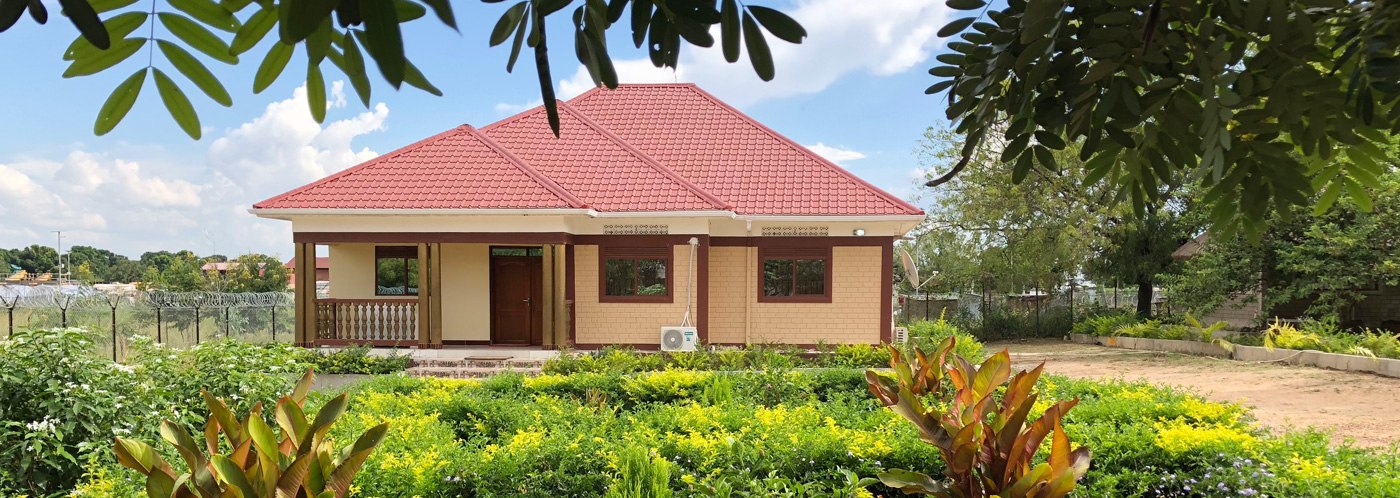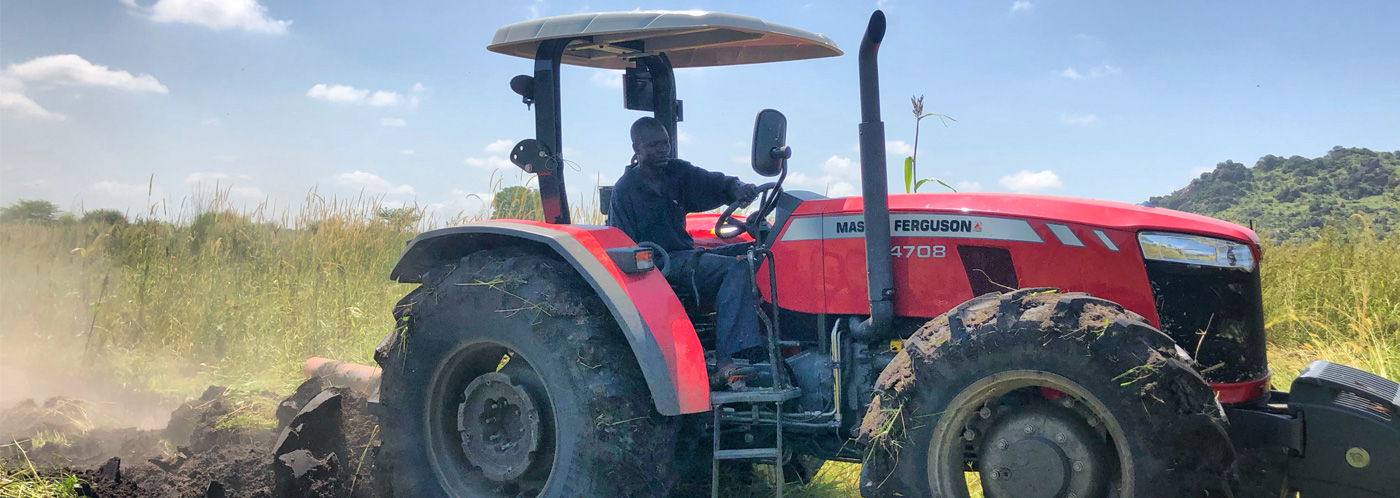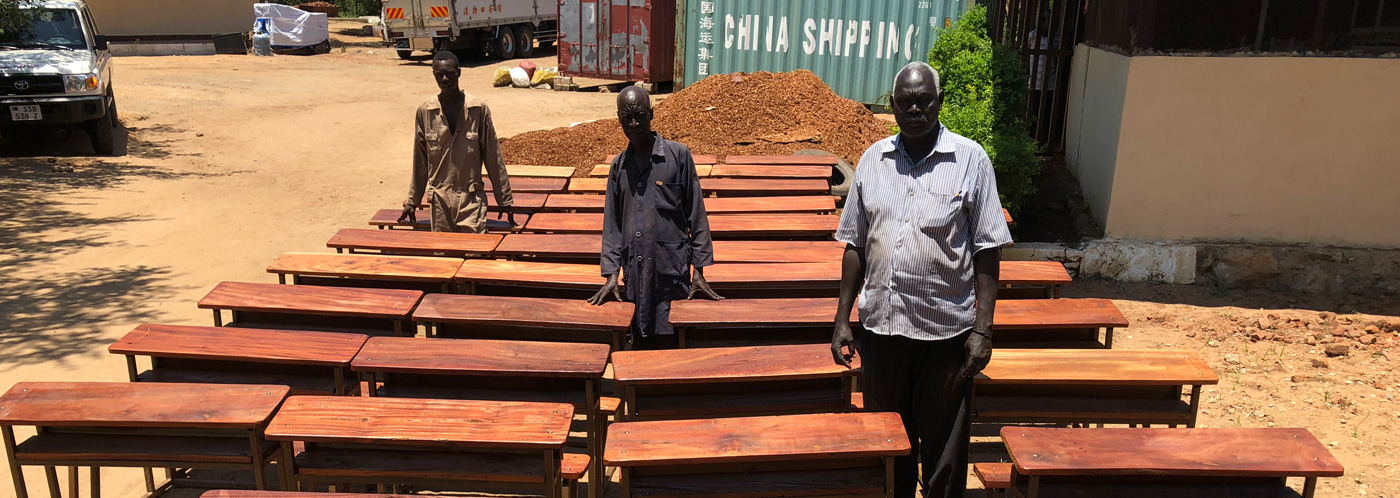Reducing the financial dependence of our local partner, SVDP Juba
SVDP, a community charity network serving the most deprived, is not intended to be a commercial company, a for-profit association. However, given the country's poverty, the association cannot rely on local donors and is therefore too much dependent on foreign ones.
The objective of the IGPs implemented since 2015 is to reduce this dependency so that the contribution of the IGPs to the financing of the vocational training program increases every year...
Implemented IGPs
1) Tailoring
Since 2015, a workshop located within the CFPDC has been producing traditional clothing, ready-to-wear, uniforms...
During the COVID epidemic in 2020, this workshop enabled the production of 13,000 masks for MSF (Médecins Sans Frontières) and 150,000 masks for the UNDP (United Nations Development Programs). The latter production did not generate revenue for SVDP, but 65 graduates from the Sewing training were paid directly by the UNDP for four months.
2) Pilot farm
Our local partner has a 80ha land in Nyarjwa, at 45 minutes from Juba.
This agricultural program is the most ambitious and promising IGP.
In addition to improving the financing of the local partner, its objectives are also to train the local population and improve the region's food security and sovereignty. It responds to a need in the country, where 80% of the population lived in rural areas before the conflict and where one in two inhabitants is in a state of food crisis. 75% of rural households eat cereals (sorghum, maize, millet). 80% of the inhabitants of the Nyarjwa region depend on agriculture. National production is far from meeting demand, particularly in Juba. The region (and the country) remain a net importer of food (from Uganda, Kenya and Rwanda). According to a 2017 WFP report, Southern Sudanese generally have to spend 155% of their daily income on a single plate of beans. "To put it another way, a meal that would cost a New Yorker only $1.20 would cost someone in Juba the equivalent of $322 ».
Until 2019, during the rainy season (May-October), cereals (maize, sorghum) and vegetables were grown on plots of about 16 ha in total each year.
Since 2016, 25 women have been trained each year in Nyarjwa.
In 2017, 58ha were fenced off to protect the land from invasion by herds belonging to armed nomadic tribes.
In 2018 and 2019, major investments were made in equipment (tractors, mills, threshers, huller, herbicide sprayer, seeder, etc.) and infrastructure (wells, réservoir, greenhouses, storage building, etc.).
In 2020, measures were taken to prevent the risk of flooding (flooding of the seasonal river that passes close to the land): trenches were dug to divert the water of the river out of the land. Greenhouse (240m2) drip-fed crops allow vegetables to be grown in a controlled environment, particularly during the dry season. Experimental plots (half an hectare) are cultivated using different irrigation methods (sprinklers/drippers). The aim was to decide which crops to grow and which irrigation source to choose (groundwater or river) in order to possibly establish an irrigation plan in 2021 on larger plots.
3) Poultry
A poultry production unit has been set up in 2012 within the Lologo VTCDC.
This unit, a pioneer in the country, meets a strong market need, but is subject to many difficulties regarding the supply abroad of laying hens and chickens, as well as food, vaccines, etc.
Synergies with the pilot farm should gradually limit the external dependence of the local partner for food, and increase the profitability of this activity.
4) Wooden furniture
Since 2016, in a workshop located within the Lologo VTCDC, furniture are manufactured to compete with made in China products that are currently preponderant on the market. The workshop regularly supplies schools in the city with school furniture.
5) Guest house
A guest house was built in 2017 within the Lologo VTCDC.
It has four bedrooms (some with double beds, others with two single beds), well equipped (air conditioning, fan, mosquito net, bedside lamps). Each room has a bathroom, with a hot water tank. The living room is large, with a TV room and a large table, a fridge and air conditioning.
All the furniture (bed, cupboards, tables, chairs) comes from the Centre's carpentry workshop.
The guest house also has a kitchen, but meals can be taken in a small restaurant built next door, in a well-kept garden. The place is a haven of peace and greenery.
The entire area (guest house, gardens and restaurant) is surrounded by a barbed wire fence. The guest house is guarded at night when there are guests.
6) Truck rental
The 20 tons truck acquired in August 2015 is rented with his driver and his assistant.
The deteriorated security situation in the country has hindered the take-off of this activity.





